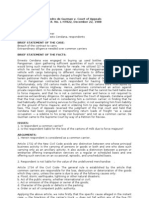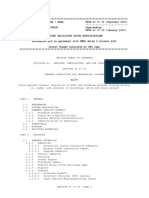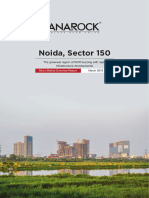G.R. No. 114167 Coastwise V CA - Digest
G.R. No. 114167 Coastwise V CA - Digest
Uploaded by
Ojie SantillanCopyright:
Available Formats
G.R. No. 114167 Coastwise V CA - Digest
G.R. No. 114167 Coastwise V CA - Digest
Uploaded by
Ojie SantillanOriginal Description:
Original Title
Copyright
Available Formats
Share this document
Did you find this document useful?
Is this content inappropriate?
Copyright:
Available Formats
G.R. No. 114167 Coastwise V CA - Digest
G.R. No. 114167 Coastwise V CA - Digest
Uploaded by
Ojie SantillanCopyright:
Available Formats
G.R. No.
114167 July 12, 1995
COASTWISE LIGHTERAGE CORPORATION, petitioner,
vs.
COURT OF APPEALS and the PHILIPPINE GENERAL INSURANCE COMPANY, respondents.
FRANCISCO, R., J.:
FACTS:
Pag-asa Sales, Inc. entered into a contract to transport molasses from the province of Negros to Manila with
Coastwise Lighterage Corporation (Coastwise for brevity), using the latter's dumb barges. The barges were
towed in tandem by the tugboat MT Marica, which is likewise owned by Coastwise. Upon reaching Manila
Bay, while approaching Pier 18, one of the barges, "Coastwise 9", struck an unknown sunken object causing
a hole in the forward compartment. As a consequence, the molasses at the cargo tanks were contaminated
and rendered unfit for the use it was intended. This prompted the consignee, Pag-asa Sales, Inc. to reject the
shipment of molasses as a total loss. Thereafter, Pag-asa Sales, Inc. filed a formal claim with the insurer of its
lost cargo, herein private respondent, Philippine General Insurance Company (PhilGen, for short) and against
the carrier, herein petitioner, Coastwise Lighterage. Coastwise Lighterage denied the claim and it was
PhilGen which paid the consignee, Pag-asa Sales, Inc., the amount of P700,000.00, representing the value of
the damaged cargo of molasses;
In turn, PhilGen then filed an action against Coastwise Lighterage before the Regional Trial Court of Manila,
seeking to recover the amount of P700,000.00 which it paid to Pag-asa Sales, Inc. for the latter's lost cargo.
PhilGen now claims to be subrogated to all the contractual rights and claims which the consignee may have
against the carrier, which is presumed to have violated the contract of carriage;
The RTC awarded the amount prayed for by PhilGen. On Coastwise Lighterage's appeal to the Court of
Appeals, the award was affirmed.
ISSUE:
Whether petitioner was transformed into a private carrier, by virtue of the contract of affreightment which it
entered into with the consignee. (NO)
RULING:
Petitioner admits that the contract it entered into with the consignee was one of affreightment .5 We agree.
Pag-asa Sales, Inc. only leased three of petitioner's vessels, in order to carry cargo from one point to another, but the
possession, command and navigation of the vessels remained with petitioner Coastwise Lighterage.
Pursuant therefore to the ruling in the Puromines case, Coastwise Lighterage, by the contract of
affreightment, was not converted into a private carrier, but remained a common carrier and was still liable as such.
The law and jurisprudence on common carriers both hold that the mere proof of delivery of goods in good
order to a carrier and the subsequent arrival of the same goods at the place of destination in bad order makes for
a prima facie case against the carrier.
It follows then that the presumption of negligence that attaches to common carriers, once the goods it
transports are lost, destroyed or deteriorated, applies to the petitioner. This presumption, which is overcome only by
proof of the exercise of extraordinary diligence, remained unrebutted in this case.
It was found that the patron of the vessel "Coastwise 9" admitted that he was not licensed. Clearly,
petitioner Coastwise Lighterage's embarking on a voyage with an unlicensed patron violates this rule. It cannot safely
claim to have exercised extraordinary diligence, by placing a person whose navigational skills are questionable, at the
helm of the vessel which eventually met the fateful accident. It may also logically, follow that a person without
license to navigate, lacks not just the skill to do so, but also the utmost familiarity with the usual and safe routes
taken by seasoned and legally authorized ones. Had the patron been licensed, he could be presumed to have both
the skill and the knowledge that would have prevented the vessel's hitting the sunken derelict ship that lay on their
way to Pier 18.
You might also like
- G.R. No. 199810 Yap V RP - DigestDocument2 pagesG.R. No. 199810 Yap V RP - DigestOjie SantillanNo ratings yet
- SpecPro - (7) - (G.R.No.180863) - Valdez vs. RepublicDocument2 pagesSpecPro - (7) - (G.R.No.180863) - Valdez vs. RepublicOjie Santillan100% (1)
- Transpo Spouses Perena and Zarate CaseDocument3 pagesTranspo Spouses Perena and Zarate CaseXtine CampuPot100% (4)
- Digest of First Philippine Industrial Corp. v. CA (G.R. No. 125948)Document2 pagesDigest of First Philippine Industrial Corp. v. CA (G.R. No. 125948)Rafael Pangilinan100% (6)
- Digest of Planters Products, Inc. v. CA (G.R. No. 101503)Document2 pagesDigest of Planters Products, Inc. v. CA (G.R. No. 101503)Rafael Pangilinan100% (3)
- Case Digest, Pedro de Guzman vs. CADocument2 pagesCase Digest, Pedro de Guzman vs. CARyan JD Lim100% (9)
- Transpo Intl Harvester Co. Vs AragonDocument2 pagesTranspo Intl Harvester Co. Vs AragonOne TwoNo ratings yet
- Ganzon vs. Court of AppealsDocument2 pagesGanzon vs. Court of AppealsLemuel Angelo M. Eleccion100% (2)
- First Philippine Industrial vs. CADocument2 pagesFirst Philippine Industrial vs. CATheodore Dolar100% (2)
- Fabre Vs CA Case DigestDocument2 pagesFabre Vs CA Case DigestBingoheart100% (1)
- VILLA REY TRANSIT, INC., Petitioner, VsDocument3 pagesVILLA REY TRANSIT, INC., Petitioner, VsOne TwoNo ratings yet
- Mod1 - 3 - GR No. 70926 - Dan Fue Leung vs. IAC and Leong YiuDocument2 pagesMod1 - 3 - GR No. 70926 - Dan Fue Leung vs. IAC and Leong YiuOjie SantillanNo ratings yet
- Mod1 - 1 - G.R. No. 41182-3 Sevilla V CADocument2 pagesMod1 - 1 - G.R. No. 41182-3 Sevilla V CAOjie SantillanNo ratings yet
- ExxonMobil Product Data Guide 2005 (v.2)Document58 pagesExxonMobil Product Data Guide 2005 (v.2)Eng AlfNo ratings yet
- Coroner's Report On CyclingDocument42 pagesCoroner's Report On CyclingTorontoistNo ratings yet
- Thermal Insulation For Mechanical SystemsDocument63 pagesThermal Insulation For Mechanical SystemsgabrielNo ratings yet
- 3 Coastwise Lighterage Corporation vs. CADocument2 pages3 Coastwise Lighterage Corporation vs. CAmei atienzaNo ratings yet
- Calvo v. UCPBDocument1 pageCalvo v. UCPBJovelan V. EscañoNo ratings yet
- Del Prado vs. Manila ElectricDocument2 pagesDel Prado vs. Manila ElectricOne TwoNo ratings yet
- Bachelor Express V CaDocument1 pageBachelor Express V CaPraisah Marjorey Casila-Forrosuelo PicotNo ratings yet
- J. 2. Williams vs. YatcoDocument2 pagesJ. 2. Williams vs. YatcoRhea CalabinesNo ratings yet
- AMERICAN PRESIDENT LINES Vs CADocument2 pagesAMERICAN PRESIDENT LINES Vs CAZachary SiayngcoNo ratings yet
- 14 Virgines Calvo v. UCPBDocument1 page14 Virgines Calvo v. UCPBEloise Coleen Sulla PerezNo ratings yet
- Philippine Rabbit Bus Lines, Inc. Vs Gabatin 24 SCRA 411Document1 pagePhilippine Rabbit Bus Lines, Inc. Vs Gabatin 24 SCRA 411WrenNo ratings yet
- PNR V CADocument2 pagesPNR V CAJogie AradaNo ratings yet
- Fabre vs. CA DigestDocument1 pageFabre vs. CA DigestBam Bathan0% (1)
- Asia Lighterage & Shipping Vs CADocument3 pagesAsia Lighterage & Shipping Vs CAShierii_ygNo ratings yet
- Magellan Manufacturing Marketing Vs CA PDFDocument1 pageMagellan Manufacturing Marketing Vs CA PDFAyumi Xuie MontefalcoNo ratings yet
- EASTERN SHIPPING LINES vs. NISSHIN and DOWA-DIGESTDocument3 pagesEASTERN SHIPPING LINES vs. NISSHIN and DOWA-DIGESTAlphaZuluNo ratings yet
- Manay Vs Cebu Air (ESPINOZA)Document2 pagesManay Vs Cebu Air (ESPINOZA)Pat Espinoza100% (2)
- 06 Cangco v. MRRDocument4 pages06 Cangco v. MRRRachelle GoNo ratings yet
- Pilapil V CA GR 52159 Dec 22Document3 pagesPilapil V CA GR 52159 Dec 22shaneAAshaneNo ratings yet
- Necesito v. ParasDocument3 pagesNecesito v. ParasBanana100% (1)
- Ganzon Vs - Court of AppealsDocument2 pagesGanzon Vs - Court of AppealsKfMaeAseronNo ratings yet
- Magellan Manufacturing Marketing Corporation v. CADocument2 pagesMagellan Manufacturing Marketing Corporation v. CAquasideliks100% (4)
- DBP Vs NLRC and Leonor AngDocument2 pagesDBP Vs NLRC and Leonor AngGillian Caye Geniza BrionesNo ratings yet
- Mapa V CADocument3 pagesMapa V CAGertrude ArquilloNo ratings yet
- Admin-310-Phil American General Insurance Company v. CADocument2 pagesAdmin-310-Phil American General Insurance Company v. CAjacaringal1100% (1)
- SPOUSES CRUZ Vs SUN HOLIDAY INC, TRANSPO CASE DIGEST, 4BLM-GROUP TWODocument3 pagesSPOUSES CRUZ Vs SUN HOLIDAY INC, TRANSPO CASE DIGEST, 4BLM-GROUP TWOMALALA MALALANo ratings yet
- Sps. Perena vs. Sps. Zarate, National Railways & CADocument3 pagesSps. Perena vs. Sps. Zarate, National Railways & CASSNo ratings yet
- Digest of de Guzman v. CA (G.R. No. 47822)Document2 pagesDigest of de Guzman v. CA (G.R. No. 47822)Rafael Pangilinan100% (1)
- Korean Airlines v. CADocument2 pagesKorean Airlines v. CAKrizzia GojarNo ratings yet
- Pci Leasing vs. Ucpb Case DigestDocument2 pagesPci Leasing vs. Ucpb Case Digestalexredrose100% (1)
- De Lim Vs Sun Life Canada - AND - Geagonia Vs CADocument6 pagesDe Lim Vs Sun Life Canada - AND - Geagonia Vs CAJosiah BalgosNo ratings yet
- National Steel Corp Vs CA (Digested)Document2 pagesNational Steel Corp Vs CA (Digested)Lyn Lyn Azarcon-Bolo100% (5)
- Pan American World Airways CaseDocument2 pagesPan American World Airways CaseGlenn Mikko MendiolaNo ratings yet
- 75 Servando V Philippine Steam Navigation - VisitacionDocument2 pages75 Servando V Philippine Steam Navigation - VisitacionJanlo Fevidal100% (2)
- Baliwag Transit Inc V CADocument2 pagesBaliwag Transit Inc V CADaniel DantesNo ratings yet
- Saludo v. CADocument3 pagesSaludo v. CADahl Abella Talosig100% (1)
- Samar Mining Co. V Nordeutscher Lloyd, 132 SCRA 539 (DIGEST) - KRVDocument2 pagesSamar Mining Co. V Nordeutscher Lloyd, 132 SCRA 539 (DIGEST) - KRVKhenlie VillaceranNo ratings yet
- Sarkies Tours V CADocument2 pagesSarkies Tours V CAStella LynNo ratings yet
- TRANSPO - San Pablo V Pantranco (GR L-61461)Document3 pagesTRANSPO - San Pablo V Pantranco (GR L-61461)Loreen DanaoNo ratings yet
- Transpo-GR 95582 Dangwa V CA DigestDocument2 pagesTranspo-GR 95582 Dangwa V CA DigestAl Simbajon100% (1)
- BPI Family Bank vs. Franco, G.R. No. 123498, 23 November 2007Document5 pagesBPI Family Bank vs. Franco, G.R. No. 123498, 23 November 2007ESS PORT OF LEGAZPI CPD-ESSNo ratings yet
- Perena vs. ZarateDocument2 pagesPerena vs. ZarateEmpleo MaryNo ratings yet
- Philippine Rabbit Bus Lines V IACDocument2 pagesPhilippine Rabbit Bus Lines V IACHoven Macasinag100% (4)
- Lara Vs ValenciaDocument2 pagesLara Vs ValenciaAnonymous 5MiN6I78I0No ratings yet
- Roldan v. Lim Ponzo & Co., G.R. No. L-11325, (December 7, 1917), 37 PHIL 285-289Document2 pagesRoldan v. Lim Ponzo & Co., G.R. No. L-11325, (December 7, 1917), 37 PHIL 285-289Al Jay MejosNo ratings yet
- Asia Lighterage and Shipping Inc Vs CA GR 147246 Aug 19 2003Document2 pagesAsia Lighterage and Shipping Inc Vs CA GR 147246 Aug 19 2003Bibo GuntherNo ratings yet
- Dangwa Transportation V CADocument1 pageDangwa Transportation V CAGin Francisco100% (3)
- Universal Shipping Lines Vs IACDocument2 pagesUniversal Shipping Lines Vs IACZachary SiayngcoNo ratings yet
- Fortune Express Vs Court of AppealsDocument1 pageFortune Express Vs Court of AppealsGarnet Hart100% (1)
- Cases 2Document16 pagesCases 2Alex M TabuacNo ratings yet
- Coastwise Lighterage CorporationDocument9 pagesCoastwise Lighterage CorporationMARK FREDERICK ORLINONo ratings yet
- Coastwise Lighterage Corporation Vs Court of Appeals and The Philippine General Insurance CompanyDocument3 pagesCoastwise Lighterage Corporation Vs Court of Appeals and The Philippine General Insurance CompanyRuzzel Diane Irada OducadoNo ratings yet
- Coastwise Lighterage Corp. Vs CADocument3 pagesCoastwise Lighterage Corp. Vs CAteepeeNo ratings yet
- 209 Coastwise Lighterage Corp. v. CA (Uy)Document2 pages209 Coastwise Lighterage Corp. v. CA (Uy)Avie UyNo ratings yet
- G.R. No. 92735 Monarch V CA - DigestDocument2 pagesG.R. No. 92735 Monarch V CA - DigestOjie Santillan100% (1)
- G.R. No. 23703 Gercio V SunLifeDocument7 pagesG.R. No. 23703 Gercio V SunLifeOjie SantillanNo ratings yet
- Specpro - 20 - Uy Kiao Eng vs. Lee - DigestDocument2 pagesSpecpro - 20 - Uy Kiao Eng vs. Lee - DigestOjie SantillanNo ratings yet
- G.R. No. 131166 Caltex V Sulpicio - DigestDocument2 pagesG.R. No. 131166 Caltex V Sulpicio - DigestOjie Santillan100% (1)
- 17 - Alawi V Alauya - SANTILLANDocument1 page17 - Alawi V Alauya - SANTILLANOjie SantillanNo ratings yet
- SpecPro - 21 - G.R. No. 174835 Reyes V Reyes - DigestDocument2 pagesSpecPro - 21 - G.R. No. 174835 Reyes V Reyes - DigestOjie SantillanNo ratings yet
- SpecPro - 27 - G.R. No. 123486 Codoy V Calugay - DigestDocument2 pagesSpecPro - 27 - G.R. No. 123486 Codoy V Calugay - DigestOjie SantillanNo ratings yet
- SPECPRO - 23 - Reynoso vs. Santiago - DIGESTDocument1 pageSPECPRO - 23 - Reynoso vs. Santiago - DIGESTOjie SantillanNo ratings yet
- SpecPro - 30 - G.R. No. 170498 MBTC V Absolute Management - DigestDocument2 pagesSpecPro - 30 - G.R. No. 170498 MBTC V Absolute Management - DigestOjie Santillan100% (1)
- Mod1 - 9 - G.R. No. L-5236 Martinez V Ong Pong CoDocument2 pagesMod1 - 9 - G.R. No. L-5236 Martinez V Ong Pong CoOjie SantillanNo ratings yet
- SpecPro - 18 - G.R. No. 159507 Saludo V American Express - DigestDocument2 pagesSpecPro - 18 - G.R. No. 159507 Saludo V American Express - DigestOjie Santillan100% (1)
- SpecPro - (13) - (G.R.No.L-48840) - Guevarra vs. GuevarraDocument2 pagesSpecPro - (13) - (G.R.No.L-48840) - Guevarra vs. GuevarraOjie SantillanNo ratings yet
- SPECPRO - 26 - Baltazar vs. Laxa - DIGESTDocument2 pagesSPECPRO - 26 - Baltazar vs. Laxa - DIGESTOjie SantillanNo ratings yet
- SpecPro - (1) - (G.R.No.133000) - Natcher vs. CADocument2 pagesSpecPro - (1) - (G.R.No.133000) - Natcher vs. CAOjie Santillan100% (2)
- SpecPro - (4) - (G.R.No.l-40502) - Fule vs. CADocument2 pagesSpecPro - (4) - (G.R.No.l-40502) - Fule vs. CAOjie SantillanNo ratings yet
- SPECPRO - 29 - Nuguid Vs Nuguid - DIGESTDocument2 pagesSPECPRO - 29 - Nuguid Vs Nuguid - DIGESTOjie SantillanNo ratings yet
- Mod1 - 7 - GR No. 127405 - Tacao vs. CA.Document3 pagesMod1 - 7 - GR No. 127405 - Tacao vs. CA.Ojie SantillanNo ratings yet
- Mod2 - 6 - G.R. No. 75875 Aurbach V Sanitary Wares - DigestDocument2 pagesMod2 - 6 - G.R. No. 75875 Aurbach V Sanitary Wares - DigestOjie SantillanNo ratings yet
- G.R. No. 160088 Dela Torre V CADocument14 pagesG.R. No. 160088 Dela Torre V CAOjie SantillanNo ratings yet
- Mod3 - 2 - G.R. No. 154486 Jarntilla V Jarantilla - DigestDocument3 pagesMod3 - 2 - G.R. No. 154486 Jarntilla V Jarantilla - DigestOjie Santillan100% (2)
- G.R. No. 114167 Coastwise V CADocument5 pagesG.R. No. 114167 Coastwise V CAOjie SantillanNo ratings yet
- Mod1 - 5 - G.R. No. L-19342 Ona V CIRDocument2 pagesMod1 - 5 - G.R. No. L-19342 Ona V CIROjie SantillanNo ratings yet
- G.R. No. 143133 Belgian V Phil FirstDocument13 pagesG.R. No. 143133 Belgian V Phil FirstOjie SantillanNo ratings yet
- Mod1 - 8 - G.R. No. 136448 Long Tim V Phil Fishing - DigestDocument2 pagesMod1 - 8 - G.R. No. 136448 Long Tim V Phil Fishing - DigestOjie SantillanNo ratings yet
- Mod1 - 4 - G.R. No. 78133 Pascual V CIR - DigestDocument2 pagesMod1 - 4 - G.R. No. 78133 Pascual V CIR - DigestOjie Santillan100% (1)
- CrimPro - 80 - G.R. No. 220685 P V Delos Santos - DigestDocument2 pagesCrimPro - 80 - G.R. No. 220685 P V Delos Santos - DigestOjie SantillanNo ratings yet
- Calculation of Slab On Grade 15 CMDocument2 pagesCalculation of Slab On Grade 15 CMRJNo ratings yet
- 2023 Tucson Abridged Owners ManualDocument382 pages2023 Tucson Abridged Owners ManualBaton RougeNo ratings yet
- KISTLER EE S R o - Priloha 2a-ZDocument2 pagesKISTLER EE S R o - Priloha 2a-Znav.shirurNo ratings yet
- Invoice HEGFD20240002328.pdf 20240708 080218 0000Document1 pageInvoice HEGFD20240002328.pdf 20240708 080218 0000mukku.tanwani.usaNo ratings yet
- Road Transport Infrastructure and Agricultural Competitiveness A Global PerspectiveDocument7 pagesRoad Transport Infrastructure and Agricultural Competitiveness A Global PerspectiveInternational Journal of Innovative Science and Research TechnologyNo ratings yet
- Engineering Drawing NautilusDocument57 pagesEngineering Drawing NautilusEpuAmerNo ratings yet
- SMP NGC CPP PresentationDocument12 pagesSMP NGC CPP PresentationJayjay TabuzoNo ratings yet
- Radar Trem MEDBDocument2 pagesRadar Trem MEDBRoman BabaevNo ratings yet
- The Third Narmada Extrados Bridge in India: Bridge Designer™: Case Study #3Document12 pagesThe Third Narmada Extrados Bridge in India: Bridge Designer™: Case Study #3ShaileshRastogi100% (1)
- MK Price List 2014Document24 pagesMK Price List 2014Kaushik KonudulaNo ratings yet
- 7525 VformDocument1 page7525 VformElisabeth JohnsonNo ratings yet
- Government of The Peoples Republic of Bangladesh: Bangladesh Road Transport Authority (Brta)Document1 pageGovernment of The Peoples Republic of Bangladesh: Bangladesh Road Transport Authority (Brta)Rani EnterpriseNo ratings yet
- ABC Commercial - Unfit To Command (2003)Document10 pagesABC Commercial - Unfit To Command (2003)sgrammerNo ratings yet
- Gmail - Your Itinerary Receipt For Booking No. NC8CJIDocument4 pagesGmail - Your Itinerary Receipt For Booking No. NC8CJIBea LouiseNo ratings yet
- DBE (Disadvantaged Business Enterprise) Program Overview For Web Content - March 2016Document28 pagesDBE (Disadvantaged Business Enterprise) Program Overview For Web Content - March 2016JAGUAR GAMINGNo ratings yet
- ProjectDocument9 pagesProjectraja panchalNo ratings yet
- Operation Portal Recon (Beta) - GuideDocument3 pagesOperation Portal Recon (Beta) - GuideJustinSaneV2No ratings yet
- Hydraulic System-1Document21 pagesHydraulic System-1M.rahman hafis janjuari HafisNo ratings yet
- 8BXQjIPBIt - spxS0 - IiY3-zBLXG - x16qR-OSHA 10 Construction - Module 4 - Study GuideDocument6 pages8BXQjIPBIt - spxS0 - IiY3-zBLXG - x16qR-OSHA 10 Construction - Module 4 - Study GuideBelkacem BouazzaNo ratings yet
- On-Board Weighing For General Trucking: Market SolutionsDocument4 pagesOn-Board Weighing For General Trucking: Market SolutionsJulioNo ratings yet
- Ce133-3 HWDocument2 pagesCe133-3 HWRalph PacilNo ratings yet
- Aom 145 1114 05 Sec 1 07Document48 pagesAom 145 1114 05 Sec 1 07bnolasco100% (1)
- 100 Sentences For Rephrasing 1292496282 NsDocument7 pages100 Sentences For Rephrasing 1292496282 NsDiego Real CastellanosNo ratings yet
- Dryer Selection and DesignDocument43 pagesDryer Selection and DesignMuluken DeaNo ratings yet
- Noida, Sector 150 - Micro Market Overview ReportDocument5 pagesNoida, Sector 150 - Micro Market Overview Reportvishal yadavNo ratings yet
- Air Conditioning (Manual Control) : Wiring DiagramDocument5 pagesAir Conditioning (Manual Control) : Wiring DiagramArmando RiveraNo ratings yet
- City Vs Countryside Reading TaskDocument2 pagesCity Vs Countryside Reading TaskKaren Gonzabay PozoNo ratings yet























































































































